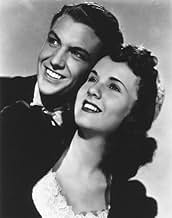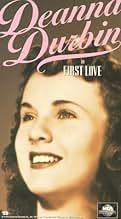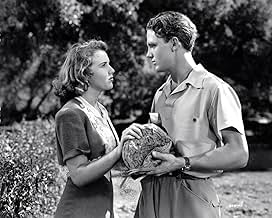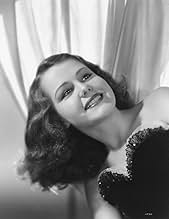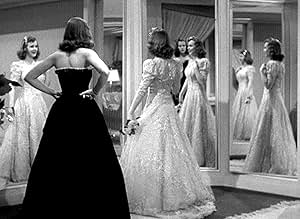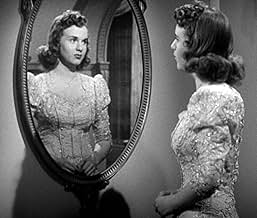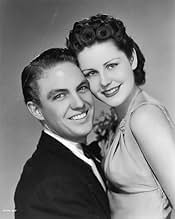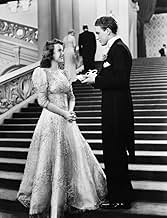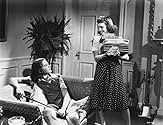An orphaned boarding school graduate secretly attends a prestigious ball, where she falls for the boyfriend of her snobbish cousin.An orphaned boarding school graduate secretly attends a prestigious ball, where she falls for the boyfriend of her snobbish cousin.An orphaned boarding school graduate secretly attends a prestigious ball, where she falls for the boyfriend of her snobbish cousin.
- Nominated for 2 Oscars
- 4 wins & 2 nominations total
Featured reviews
I'll take my Cinderella with Prokovief, but after watching First Love, a first-rate film with a quease-inducing title, I'll place this Deanna Durbin vehicle second.
"You go up there to New York," says Miss Wiggins, a crotchety, spinster music teacher, to Connie Harding, who has just graduated from a fancy private school. "Make those people love you just as much as we do." Connie is an orphan, and Miss Wiggins is referring to her uncle and his family, wealthy New Yorkers who have paid all her bills but were just too busy to drive down for her graduation. They sent one of the family's limousines for her. "And then," Miss Wiggins says, "maybe, someday, you will meet a prince, and you'll live happily ever after."
"Those fairy stories haven't come true for over 100 years, Miss Wiggins," Connie says.
Miss Wiggins thumps the floor with her cane. "Fiddlesticks! We just have to dust them off...streamline them a bit."
And this is what director Henry Koster, one of the best of Durbin's directors, has managed to do. He is aided immeasurably by a clever script ("This is terrible," says Barbara, Connie's awful cousin, "I can't be more than an hour and a half late to Wilma's party...she's one of my personal friends!") and solid, pungent performances by some very good character actors. The story's sweetness is genuine, based on the intrinsic sympathy for a young girl who manages to overcome obstacles with the help of others, and then finds happiness. Deanna Durbin at 18 is an intriguing combination of naturalness and skill. We like her the moment we see her, and her ability to win us over is enhanced when we meet the family. Her uncle (Eugene Palette) is a gruff man who seemingly only wants to keep far away from his wife and children, as well as away from Connie. When we meet the rest of the family, we sympathize with him. His wife (Leatrice Joy) is unpleasantly scatter-brained. His daughter (Helen Parish), a year older than Connie, is a snobbish, selfish, manipulating terror. His son (Lewis Howard) is so languid he make laziness seem tiring.
There's a lavish ball, and Connie gets to go thanks to the intervention of the servants, led by that great butler-playing specialist, Charles Coleman. She meets a prince of a wealthy young man, Ted Drake (whom she met once before with mud on her face). When they waltz at the ball, all the other dancers fade away in a clever bit of instant love setting by Koster. Then Durbin receives her first screen kiss, from Robert Stack as Ted, as naturally as she acts. After the usual ups and downs for Cinderella, there's a happy ending which involves a matching slipper. Her uncle becomes the worm who turns, dealing brisk and satisfying retribution to his family, and even Miss Wiggins smiles. We are assured that Connie and Ted live happily ever after.
Durbin sings two or three songs, including the hoary old tear-jerker "There's No Place Like Home." More impressively, she sings "Un Bel Di." Impressively, because not many 18-year- olds I've heard of would be able to handle the emotions Puccini lays on with such a trowel. The aria is a tear-jerker, too, but a great one. It takes a singer who knows what she's doing to handle the emotions (in Italian) as well as the notes. Durbin carries it off impressively with her usual uncanny poise.
First Love, except for that title, is completely and satisfyingly charming.
"You go up there to New York," says Miss Wiggins, a crotchety, spinster music teacher, to Connie Harding, who has just graduated from a fancy private school. "Make those people love you just as much as we do." Connie is an orphan, and Miss Wiggins is referring to her uncle and his family, wealthy New Yorkers who have paid all her bills but were just too busy to drive down for her graduation. They sent one of the family's limousines for her. "And then," Miss Wiggins says, "maybe, someday, you will meet a prince, and you'll live happily ever after."
"Those fairy stories haven't come true for over 100 years, Miss Wiggins," Connie says.
Miss Wiggins thumps the floor with her cane. "Fiddlesticks! We just have to dust them off...streamline them a bit."
And this is what director Henry Koster, one of the best of Durbin's directors, has managed to do. He is aided immeasurably by a clever script ("This is terrible," says Barbara, Connie's awful cousin, "I can't be more than an hour and a half late to Wilma's party...she's one of my personal friends!") and solid, pungent performances by some very good character actors. The story's sweetness is genuine, based on the intrinsic sympathy for a young girl who manages to overcome obstacles with the help of others, and then finds happiness. Deanna Durbin at 18 is an intriguing combination of naturalness and skill. We like her the moment we see her, and her ability to win us over is enhanced when we meet the family. Her uncle (Eugene Palette) is a gruff man who seemingly only wants to keep far away from his wife and children, as well as away from Connie. When we meet the rest of the family, we sympathize with him. His wife (Leatrice Joy) is unpleasantly scatter-brained. His daughter (Helen Parish), a year older than Connie, is a snobbish, selfish, manipulating terror. His son (Lewis Howard) is so languid he make laziness seem tiring.
There's a lavish ball, and Connie gets to go thanks to the intervention of the servants, led by that great butler-playing specialist, Charles Coleman. She meets a prince of a wealthy young man, Ted Drake (whom she met once before with mud on her face). When they waltz at the ball, all the other dancers fade away in a clever bit of instant love setting by Koster. Then Durbin receives her first screen kiss, from Robert Stack as Ted, as naturally as she acts. After the usual ups and downs for Cinderella, there's a happy ending which involves a matching slipper. Her uncle becomes the worm who turns, dealing brisk and satisfying retribution to his family, and even Miss Wiggins smiles. We are assured that Connie and Ted live happily ever after.
Durbin sings two or three songs, including the hoary old tear-jerker "There's No Place Like Home." More impressively, she sings "Un Bel Di." Impressively, because not many 18-year- olds I've heard of would be able to handle the emotions Puccini lays on with such a trowel. The aria is a tear-jerker, too, but a great one. It takes a singer who knows what she's doing to handle the emotions (in Italian) as well as the notes. Durbin carries it off impressively with her usual uncanny poise.
First Love, except for that title, is completely and satisfyingly charming.
"First Love" is a delightful 20th century Cinderella story, with good songs by Deanna Durbin and some light comedy. The film was nominated for three Academy Awards. Since most people know the Cinderella plot, a lot more need not be said. Except that a very good supporting cast does justice to a good screenplay in this modern adaptation of the story.
Durbin is Constance Harding in the Cinderella role. The prince role is Ted Drake, played by Robert Stack. There isn't a fairy godmother, a pumpkin or adaptable mice. But this Cinderella has relatives with a house and servants who take to her. And, a somewhat beleaguered and withdrawn Uncle James Clinton (played by Eugene Pallette), who eventually comes to life thanks to Constance.
When she is rejected by her cousins, Constance returns to the orphanage where she was raised. She had known family there, among all the other girls, the teachers and the director, Miss Wiggins (played by Kathleen Howard). She says she will stay there and become a teacher also. But she gets some sage counseling from Miss Wiggins.
Miss Wiggins, "Do you like cats?" Constance Harding, "No, not much." Miss Wiggins, "Huh! You'll get to love them. They've got sense. They're like men. Feed them, pet them, and admire them, and they'll purr. Every woman wants to make somebody purr. You want to lock yourself up in a world of women."
Constance notices the ladies of the faculty with tears on their faces listening to her sing a beautiful aria. She later asks Miss Wiggins about it. Wiggins says, "Old maids ore only happy when they cry. You'll find that out."
But, just as in the fairy tale, the prince charming in this film finds his Cinderella. And Ted Drake sees to it that Constance won't be among the spinster faculty at the orphanage. It's an entertaining film that the whole family should enjoy.
Durbin is Constance Harding in the Cinderella role. The prince role is Ted Drake, played by Robert Stack. There isn't a fairy godmother, a pumpkin or adaptable mice. But this Cinderella has relatives with a house and servants who take to her. And, a somewhat beleaguered and withdrawn Uncle James Clinton (played by Eugene Pallette), who eventually comes to life thanks to Constance.
When she is rejected by her cousins, Constance returns to the orphanage where she was raised. She had known family there, among all the other girls, the teachers and the director, Miss Wiggins (played by Kathleen Howard). She says she will stay there and become a teacher also. But she gets some sage counseling from Miss Wiggins.
Miss Wiggins, "Do you like cats?" Constance Harding, "No, not much." Miss Wiggins, "Huh! You'll get to love them. They've got sense. They're like men. Feed them, pet them, and admire them, and they'll purr. Every woman wants to make somebody purr. You want to lock yourself up in a world of women."
Constance notices the ladies of the faculty with tears on their faces listening to her sing a beautiful aria. She later asks Miss Wiggins about it. Wiggins says, "Old maids ore only happy when they cry. You'll find that out."
But, just as in the fairy tale, the prince charming in this film finds his Cinderella. And Ted Drake sees to it that Constance won't be among the spinster faculty at the orphanage. It's an entertaining film that the whole family should enjoy.
A maturing DEANNA DURBIN and a strikingly handsome young ROBERT STACK are the enjoyable romantic leads in this Cinderella tale that spins along with a few Durbin songs tossed in for good measure.
Deanna plays the orphaned cousin of a rich and snobbish family that tries to get her to stay home from a lavish ball. With the help of servants (instead of mice), Deanna gets to attend the ball, delivers an outstanding solo, meets the handsome "prince" (Stack) and has to fend off the insults of her snobbish cousin (Helen Parrish).
The slight plot moves effortlessly toward a happy ending. Durbin fans should love this one--it's easy to take and easy to love. Eugene Pallette gives a fine comic performance as her gruff uncle and the rest of the cast does a professional job under Henry Koster's direction.
Deanna plays the orphaned cousin of a rich and snobbish family that tries to get her to stay home from a lavish ball. With the help of servants (instead of mice), Deanna gets to attend the ball, delivers an outstanding solo, meets the handsome "prince" (Stack) and has to fend off the insults of her snobbish cousin (Helen Parrish).
The slight plot moves effortlessly toward a happy ending. Durbin fans should love this one--it's easy to take and easy to love. Eugene Pallette gives a fine comic performance as her gruff uncle and the rest of the cast does a professional job under Henry Koster's direction.
Two very young actors make up this cinderella story, Robert Stack (just 20) is the hero and Deanna at 18 still has quite a bit of puppy fat on her face (I didn't like the hair style - was it to make her seem older? ). She, an Orphan like Cinderella lands up in - not step mother here, but rich maternal uncle's home. Here of course there was one cousin, of the step-sister type the other cousin of opposite gender, the aunt and even the uncle are really not villainish by nature, but villain by the lack of empathy, not only towards our Cinderella, but towards the whole world.
There are of course nice songs too, has to be when Deanna is there. The movie is well made, and very watch-able, and of course the end is predictable in any fairy tale. Along with Deanna there are two more lovely girls, Helen Parish (the Cousin), a quite frequent co-actor of Deanna, and June Storey, another Canadian, both trying to win the Prince Charming.
There are two interesting things here, one puzzled me, till I understood what it was and other one, the main song, wasn't properly visualised.
If there is a call to sing a Strauss' waltz, even if you specify it is the Junior's, unless you know which one it is, no one can sing it. More so, it had been told to have a bit of modifications, some bars were changed, probably to cater to her voice-spectrum by the singer, Mme Cottellini, who was supposed to sing it, mentioned. Even more problem in it was, that even had she caught the opening, she still would have been in for a trouble, since it was a mix of three of Strauss' Waltzs, Schatz-Walzer, the beautiful Rosen aus dem Süden(the main body) and lagunen Walzer (finale) : unless one knows that, it would be impossible.
The interesting and wonder-ful (not necessary wonderful) portion was, after this waltz, when Deanna was dancing with Stack, I observed there was something in her left hand, what was it I wondered.... and then it struck me. That was the cloak-ticket. And she had retained it, held between the forefinger and middle finger of her hand, till she exchanged it for cloak. In fact she had been playing with it, even during the 'spring waltz'. This was unexpected that one would go for that much precision. I wonder who thought about it, Koster or Deanna ? I am sure the viewers won't have noticed it, or even wondered if it wasn't there (you could have some pocket or fold in the dress to keep it).
There are of course nice songs too, has to be when Deanna is there. The movie is well made, and very watch-able, and of course the end is predictable in any fairy tale. Along with Deanna there are two more lovely girls, Helen Parish (the Cousin), a quite frequent co-actor of Deanna, and June Storey, another Canadian, both trying to win the Prince Charming.
There are two interesting things here, one puzzled me, till I understood what it was and other one, the main song, wasn't properly visualised.
If there is a call to sing a Strauss' waltz, even if you specify it is the Junior's, unless you know which one it is, no one can sing it. More so, it had been told to have a bit of modifications, some bars were changed, probably to cater to her voice-spectrum by the singer, Mme Cottellini, who was supposed to sing it, mentioned. Even more problem in it was, that even had she caught the opening, she still would have been in for a trouble, since it was a mix of three of Strauss' Waltzs, Schatz-Walzer, the beautiful Rosen aus dem Süden(the main body) and lagunen Walzer (finale) : unless one knows that, it would be impossible.
The interesting and wonder-ful (not necessary wonderful) portion was, after this waltz, when Deanna was dancing with Stack, I observed there was something in her left hand, what was it I wondered.... and then it struck me. That was the cloak-ticket. And she had retained it, held between the forefinger and middle finger of her hand, till she exchanged it for cloak. In fact she had been playing with it, even during the 'spring waltz'. This was unexpected that one would go for that much precision. I wonder who thought about it, Koster or Deanna ? I am sure the viewers won't have noticed it, or even wondered if it wasn't there (you could have some pocket or fold in the dress to keep it).
Young Deanna Durbin goes to live with her uncle Eugene Palette and a group of snooty society cousins in this film. They treat her like a country cousin and snub her generally including her aunt by marriage. But little do they know that Deanna is destined to find her First Love in this story reworked from the Cinderella fairy tale.
After three years Deanna was growing up on screen and the folks at Universal Pictures decided she ought to have her first screen kiss. The one tapped for the honor was a guy making his screen debut Robert Stack.
The one who really treats her rotten is her débutante cousin Helen Parrish and her equally snobby friend June Storey. Deanna is not treated any better than one of the staff at her house, like Cinderella she might as well be relegated to being a chimney sweep.
Stack is the guy that Parrish and Storey have set their caps for, he's another society kid. But he likes simple and unaffected Deanna who ironically Parrish sets up the meeting between them. That's a rather funny scene.
Some good songs for Durbin highlighted the classic There's No Place Like Home, Amapola, and Un Bel Di from Madame Butterfly. And of course one of the most publicized kisses ever in screen history.
First Love brought home Oscar nominations for Sound, Art&Set Decoration, and Musical Scoring for Universal Pictures. Little Miss Fix-It was definitely growing up and her future roles would show a maturing Durbin for the movie-going public. It still is fine entertainment.
After three years Deanna was growing up on screen and the folks at Universal Pictures decided she ought to have her first screen kiss. The one tapped for the honor was a guy making his screen debut Robert Stack.
The one who really treats her rotten is her débutante cousin Helen Parrish and her equally snobby friend June Storey. Deanna is not treated any better than one of the staff at her house, like Cinderella she might as well be relegated to being a chimney sweep.
Stack is the guy that Parrish and Storey have set their caps for, he's another society kid. But he likes simple and unaffected Deanna who ironically Parrish sets up the meeting between them. That's a rather funny scene.
Some good songs for Durbin highlighted the classic There's No Place Like Home, Amapola, and Un Bel Di from Madame Butterfly. And of course one of the most publicized kisses ever in screen history.
First Love brought home Oscar nominations for Sound, Art&Set Decoration, and Musical Scoring for Universal Pictures. Little Miss Fix-It was definitely growing up and her future roles would show a maturing Durbin for the movie-going public. It still is fine entertainment.
Did you know
- TriviaDeanna Durbin's character gives her birthdate as 4 December - Durbin's own.
- GoofsThe movement of Deanna during the scene with her mirror.
- Quotes
Miss Wiggins: The trouble with you young people is you don't believe in anything. You're afraid, afraid of hope, afraid of happiness.
- ConnectionsFeatured in Liens éternels (1943)
- How long is First Love?Powered by Alexa
Details
- Runtime1 hour 24 minutes
- Color
- Aspect ratio
- 1.37 : 1
Contribute to this page
Suggest an edit or add missing content

